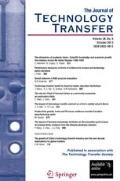Abstract
Management scholars have widely acknowledged that we live a new era of economic development, the so-called knowledge economy, where knowledge appears to be the key foundation of value creation. During the recent years, it seems like knowledge has become an all-embracing term that has come to stand for all the magic that goes on within contemporary organizations, making them successful. Knowledge is then an immaterial and ubiquitous asset, embodied into individuals and embedded in their routines and artefacts. From this shadowy asset arises the main research purpose of several management scholars: to ascertain the underlying organizational alchemy and the mystery of knowledge. In the managerial literature, when knowledge comes so deeply incorporated within a firm this has been usually reflected in a widely used concept: the knowledge-intensive enterprise, a term that has received significant attention from scholars and researchers, now expressing a category of organizations within academic scientific research. Likewise, a growing debate is emerging among policy makers and scholars in technology transfer processes and tools for KIEs worldwide.
Similar content being viewed by others
References
Alvesson, M. (2000). Social identity and the problem of loyalty in knowledge-intensive companies. Journal of Management Studies, 37(8), 1101–1122.
Berry, H. (2014). Global Integration and Innovation: Multicountry Knowledge Generation Within MNCs. Strategic Management Journal, 35(6), 869–890.
Blackler, F. (1995). Knowledge, knowledge work and organizations: An overview and interpretations. Organization Studies, 16(6), 1021–1046.
Campanella, F., Del Giudice, M., & Della Peruta, M. R. (2013). The role of information in the credit relationship. Journal of Innovation and Entrepreneurship, 2(1), 1.
Carayannis, E. G., Dubina, I. N., & Ilinova, A. A. (2015a). Licensing in the context of Entrepreneurial University activity: An empirical evidence and a theoretical model. Journal of the Knowledge Economy, 6(1), 1–12.
Carayannis, E. G., Meissner, D., & Edelkina, A. (2015b). Targeted innovation policy and practice intelligence (TIP2E): Concepts and implications for theory, policy and practice. The Journal of Technology Transfer. doi:10.1007/s10961-015-9433-8.
Carayannis, E. G., & Rakhmatullin, R. (2014). The quadruple/quintuple innovation helixes and smart specialisation strategies for sustainable and inclusive growth in Europe and beyond. Journal of the Knowledge Economy, 5(2), 212–239.
Carayannis, E. G., Sindakis, S., & Walter, C. (2015c). Business model innovation as lever of organizational sustainability. The Journal of Technology Transfer, 40(1), 85–104.
Del Giudice, M., & Della Peruta, M. R. (2013). Unpacking open innovation: Highlights from a co-evolutionary inquiry. Berlin: Springer.
Del Giudice, M., Della Peruta, M. R., & Maggioni, V. (2013). Collective knowledge and organizational routines within academic communities of practice: An empirical research on science-entrepreneurs. Journal of the Knowledge Economy, 4(3), 260–278.
Durand, T. (1998). The alchemy of competence. In G. Hamel, C. K. Prahalad, H. Thomas, & D. O Neal (Eds.), Strategic flexibility: Managing in a turbulent environment (pp. 303–330). Chichester: John Wiley & Sons.
Keller, W. (2004). International technology diffusion. Journal of Economic Literature, 42(3), 752–782.
Maggioni, V., & Giudice, D. M. (2008). Scientific formulas and cognitive economics, beyond in vitro entrepreneurship. Industry and Higher Education, 22(6), 365–372.
Prusak, L. (2009). Knowledge in organisations. Abingdon: Routledge.
Starbuck, W. H. (1992). Learning by knowledge intensive firms. Journal of Management Studies, 29(6), 713–740.
Straub, D., & Del Giudice, M. (2012). Use. MIS Q, 36(4), 3–11.
Sveiby, K. E., & Riesling, A. (1986). Kunskapföretaget—Seklets Viktigaste Ledarutmaning?. Malmö: Liber AB.
Author information
Authors and Affiliations
Corresponding author
Rights and permissions
About this article
Cite this article
Del Giudice, M., Carayannis, E.G. & Maggioni, V. Global knowledge intensive enterprises and international technology transfer: emerging perspectives from a quadruple helix environment. J Technol Transf 42, 229–235 (2017). https://doi.org/10.1007/s10961-016-9496-1
Published:
Issue Date:
DOI: https://doi.org/10.1007/s10961-016-9496-1




